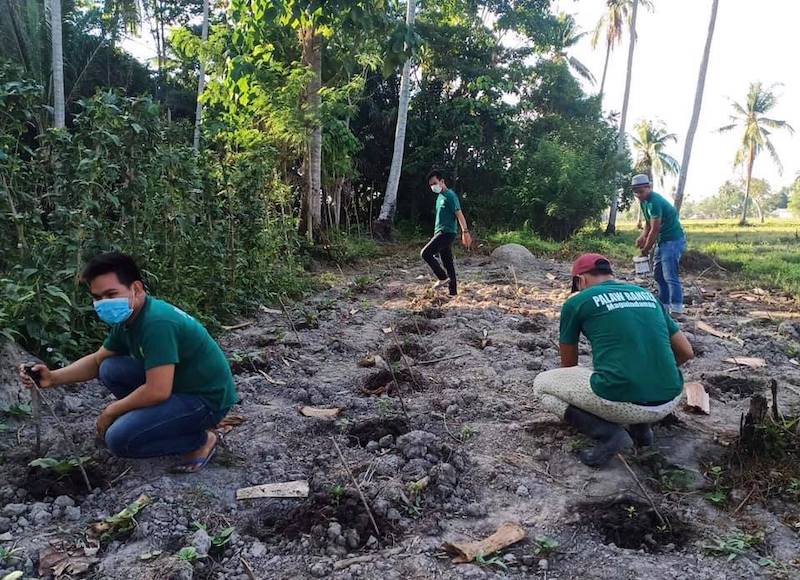KORONADAL CITY (MindaNews / 25 April) — Some local government units (LGUs) in Mindanao have started cultivating “survival gardens” to help ensure the supply of vegetable products in their areas as the nation grapples with the impact of the coronavirus disease (COVID-19).
This developed as several LGUs included vegetables in their distributed relief packs usually consisting of rice, canned goods and noodles, to boost the nutrition of the beneficiaries.
In the Bangsamoro Autonomous Region in Muslim Mindanao (BARMM), members of the ex-rebel group Moro Islamic Liberation Front (MILF), working as Palaw rangers or forest rangers, have been helping establish survival gardens in forestlands in the area.
Abdulraof Macacua, BARMM executive secretary, said the survival gardens were conceptualized as a strategy to ensure food security in the region while the COVID-19 contagion continues to rear its ugly head.
 Palaw (forest) rangers in Maguindanao province plant vegetables in a “survival garden” for food security in the Bangsamoro region in time of the COVID-19 pandemic. Photo from the Facebook page of MENRE-BARMM.
Palaw (forest) rangers in Maguindanao province plant vegetables in a “survival garden” for food security in the Bangsamoro region in time of the COVID-19 pandemic. Photo from the Facebook page of MENRE-BARMM.
“This survival garden will serve as another source of food for the region’s constituents, helping them ease the shortage of food supply,” he said in a statement.
BARMM, home to around four million people, comprises the provinces of Maguindanao and Lanao del Sur in mainland Mindanao and the island provinces of Basilan, Sulu and Tawi-tawi.
Macacua, who is also the BARMM’ Minister of Environment, Natural Resources and Energy, said workers under the agency have been ordered to establish food production areas in forestlands suitable for vegetables and short term crops.
According to him, the move to cultivate survival gardens is pursuant to the provisions of Republic Act 11469 or the “Bayanihan to Heal as One Act,” which granted President Duterte additional authority to combat the coronavirus pandemic in the Philippines.
Outside the BARMM, the town of Tampakan in South Cotabato, known for its huge untapped copper and gold minefield, also recently cleared up a stretch of land in the mountain village of Tablu for the planting of various vegetable crops.
Tampakan Mayor Leonard Escobillo said they have set up a water system for the vegetable farm that they are hoping to also transform into an agri-tourism site.
“The Tampakan LGU will plant more gulay (vegetable) to ensure we have enough food supply,” he said.
Tampakan plans to plant vegetable crops included in the Filipino folk song, “Bahay Kubo” (Nipa Hut) in the highland village with a climate suitable for vegetable cultivation.
Vegetables included in the “Bahay Kubo” song are ginger, radish, squash, turnip, string beans, onions and tomatoes, among others.
Escobillo said the local government purchased the vegetables of local farmers and market vendors for inclusion in earlier food pack distributions to help boost the nutrition of beneficiaries.
South Cotabato 2nd District Rep. Ferdinand Hernandez also allotted funds to purchase the vegetable harvest of farmers in a remote community in Lake Sebu town, for distribution in the lowlands.
This, after the farmers’ vegetable harvests were just piling up because of lack of buyers due to the lockdown imposed in South Cotabato and other nearby areas.
South Cotabato Gov. Reynaldo Tamayo, Jr. said the provincial government also purchased vegetables from local farmers and distributed them as part of the relief food packs.
He encouraged farmers to continue planting vegetables to sustain the supply.
“Aside from distributing healthy vegetables to our constituents, we are helping farmers earn income during this crisis,” Tamayo said.
The Department of Agriculture’s Agricultural Training Institute – Region 12 also distributed free vegetable seedlings, such as squash, pole sitaw (beans) and ampalaya, among others, to encourage people to put up home gardens. (Bong S. Sarmiento / MindaNews)
